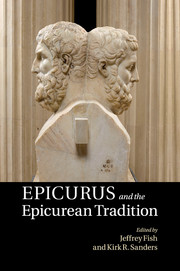Book contents
- Frontmatter
- Contents
- Acknowledgements
- Note on Abbreviations
- List of Contributors
- 1 Introduction
- 2 Autodidact and student: on the relationship of authority and autonomy in Epicurus and the Epicurean tradition
- 3 Epicurus' theological innatism
- 4 Epicurus on the gods
- 5 Not all politicians are Sisyphus: what Roman Epicureans were taught about politics
- 6 Epicurean virtues, Epicurean friendship: Cicero vs the Herculaneum papyri
- 7 Cicero's use and abuse of Epicurean theology
- 8 The necessity of anger in Philodemus' On Anger
- 9 Philodemus, Seneca and Plutarch on anger
- 10 Philodemus and the fear of premature death
- Bibliography
- General index
- Index of passages
10 - Philodemus and the fear of premature death
Published online by Cambridge University Press: 01 June 2011
- Frontmatter
- Contents
- Acknowledgements
- Note on Abbreviations
- List of Contributors
- 1 Introduction
- 2 Autodidact and student: on the relationship of authority and autonomy in Epicurus and the Epicurean tradition
- 3 Epicurus' theological innatism
- 4 Epicurus on the gods
- 5 Not all politicians are Sisyphus: what Roman Epicureans were taught about politics
- 6 Epicurean virtues, Epicurean friendship: Cicero vs the Herculaneum papyri
- 7 Cicero's use and abuse of Epicurean theology
- 8 The necessity of anger in Philodemus' On Anger
- 9 Philodemus, Seneca and Plutarch on anger
- 10 Philodemus and the fear of premature death
- Bibliography
- General index
- Index of passages
Summary
INTRODUCTION
Attempts to dispel fear of death by claiming that life continues on in some fashion post mortem are commonplace. Such was not, however, the approach adopted by the ancient Epicureans. On the contrary, Epicurus is frequently credited with originating the argument that death is not to be feared, precisely because it is the end of existence. That no person survives his own death is a proposition to which the Epicureans are unquestionably committed. It is also true that Epicurus and his followers consistently represent fear of death as one of the greatest impediments to human flourishing. Nevertheless, Epicurean attitudes toward death and its associated fears turn out to be considerably more nuanced than generally recognized.
To speak of the fear of death already risks obscuring the protean nature of the phenomenon in question. People in fact fear a diversity of things related to death for equally diverse reasons. The Epicureans are sometimes accused of failing to appreciate, or at least to have addressed, this actual multiplicity of death-related fears. Such accusations are unwarranted, as several recent commentators have convincingly demonstrated. Epicurean sources in fact contain arguments directed at many distinct fears of death. What has yet to be fully appreciated is the degree to which Epicureanism is able to countenance at least certain of these fears.
- Type
- Chapter
- Information
- Epicurus and the Epicurean Tradition , pp. 211 - 234Publisher: Cambridge University PressPrint publication year: 2011
- 1
- Cited by



